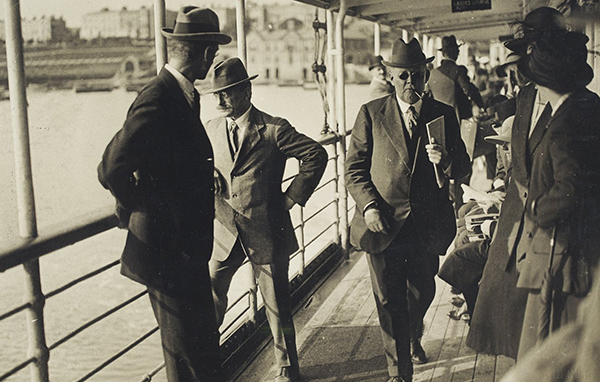The Truce and preliminary negotiations between de Valera and Lloyd George
Published in Featured-Archive-Post, Issue 4 (July/August 2021), Volume 29By Joseph E.A. Connell Jr
As British hopes for a military victory in the War of Independence faded, they began to wonder whether Ireland was worth the price in lives or money. Progressively throughout the first half of 1921 peace feelers were extended, and in July 1921 a truce was agreed. On 9 July terms were agreed upon and the truce went into effect at noon on 11 July 1921. Following the truce, Eamon de Valera and Prime Minister Lloyd George engaged in meetings in London to determine how negotiations should proceed.
De Valera continually pressed his interpretation of the meetings in correspondence over the next few months. Lloyd George, however, just as firmly made it clear that Britain would not enter negotiations on the basis that Ireland was ‘an independent sovereign state’. On 18 September 1921 Lloyd George wrote:
‘From the very outset of our conversation I told you that we looked to Ireland to own allegiance to the Throne, and to make her future as a member of the British Commonwealth. That was the basis of our proposals, and we cannot alter it. The status which you now claim for your delegates is, in effect, a repudiation of that status.’
Finally, after more correspondence between the two over the next two weeks, on 30 September de Valera was able to write:
‘Our respective positions have been stated and are understood and we agree that conference, not correspondence, is the most practical and hopeful way to an understanding. We accept the invitation, and our Delegates will meet you in London on the date mentioned “to explore every possibility of settlement by personal discussion”.’
Frank Pakenham (Lord Longford), in Peace by ordeal, notes that there were two separate ‘debates’ entangled in the correspondence: whether England had any right to restrict Ireland’s form of government; and on what basis could a conference be held in the light of the first issue. He opines that discussion on the first issue favoured Ireland but on the second favoured England. He further points out that in de Valera’s eyes the position of a Republic ‘had been preserved’, but the British position was clearly that Ireland would remain a member of the Empire. He concludes:
‘On abstract rights de Valera had secured an agreeable academic triumph. On the question of status at the Conference he had, formally at least, held his own. But in the race to secure opinion favourable to the settlements that they respectively contemplated, de Valera was still waiting for the pistol while Lloyd George was half-way home.’
One thing that was absolutely clear from the London meetings and from correspondence between de Valera and Lloyd George leading up to the sending of the delegation to London was that there was no question of a Republic. Both the cabinet in Dublin and the cabinet in London were aware of that. De Valera clearly grasped what was on offer: an acceptance of partition, an Irish Free State with the same dominion status as Canada or Australia, an oath of allegiance to the Crown, and the installation of a governor-general.
The Republic had been shelved before the final negotiations began and everyone concerned, particularly de Valera, recognised this. In July 1921 he had told Prime Minister Smuts, ‘If the status of a Dominion is offered to me, I will use all our machinery to get the Irish people to accept it’.
When asked to lead the delegation, Arthur Griffith agreed but told de Valera, ‘I know, and you know, that I can’t bring back a Republic’. Later, Michael Collins was to say that ‘if we all stood on the recognition of the Irish Republic as a prelude to any conference we could very easily have said so, and there would have been no conference … It was the acceptance of the invitation that formed the compromise.’
Joseph E.A. Connell Jr is the author of The shadow war: Michael Collins and the politics of violence (Eastwood Books).

Above: Eamon de Valera (left) and Arthur Griffith leaving Dublin on board the Curraghmore mail-boat the day after the truce came into effect, 12 July 1921. They are on their way to negotiate with British Prime Minister David Lloyd George in London. (NLI)
















